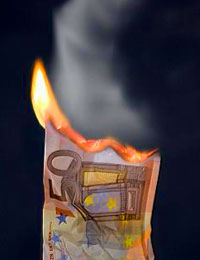The euro hit a 4-year low today, making stock markets around the world dip. Clearly, the Eurozone crisis isn’t just limited to Athenians protesting and European Central Bankers scratching their heads. We gathered a set of links to describe how the European recession will affect the US, China, and other countries around the world.
A weak Euro eats up European importers’ margins, putting Chinese, American, and Japanese exporters at a disadvantage. (New York Times)
Germany is the fourth biggest US trade partner; France is the second biggest. The US risks losing millions if these valuable trading partners won’t buy. (US Census)
Plunging into the red with fiscal policies led to Greece’s collapse. Is the US next? (Business Insider)
The Big 5 US banks are heavily exposed to Europe, especially Germany and France. If PIIGS (Portugal, Ireland, Italy, Greece, Spain) debt makes those countries restructure their debt, US banks will face a second shock. (Wall St. Journal)
A contagion effect will make banks freeze loans and cripple central EU banks, sending a ripple effect through the world. (New York Times)
The Eurozone is responsible for about 15% of profits in the S&P 500. A lower Euro will eat up an estimated 4% of S&P profits next year; 3.5% this year. (Zero Hedge)
Investors are dumping euros and flocking to gold. Goldbugs are singing. (Seeking Alpha)
Countries like Poland that receive EU structural funds will get their loans cut, resulting in fewer improvement projects. (Wall St. Journal)
Another recession in Europe will increase social unrest there. It has already increased nationalism. (Wall St. Journal, Guardian)
The EU’s rescue package created a European Central Bank overhaul that will herald inflation in Europe. (Spiegel)
The Eurozone may well shed some of its members or restructure itself. (Christian Science Monitor)
Maybe the Euro will even fall apart within the year. Or not. (Bloomberg)

